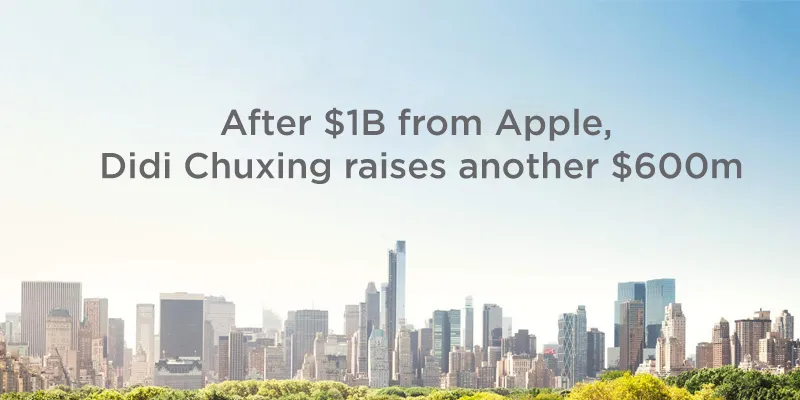Uber rival Didi Chuxing raises $600m from China Life Insurance
Didi Chuxing, Uber's rival in China, on Monday announced that it had raised $600 million in funding from China Life Insurance Co Ltd, according to Reuters. The investment includes an equity investment of $300 million and a long-term debt investment of $305 million. Just a month ago, in May 2016, Didi Chuxing had raised $1 billion from Apple Inc.

Story so far
Founded in 2012 by Cheng Wei, Didi Chuxing dominates the ride-sharing market in China and had last month claimed that it completes more than 11 million rides a day, with a market share of over 87 percent for private car-hailing in China. Some of the company's investors include Softbank, Temasek Holdings and Tencent. Didi is also an investor in India’s Ola.
After competing against each other, Didi Kuaidi and Kuaidi Dache merged together in Febraury 2015, with the combined entity being valued at $6 billion at that time. China Life and Didi Chuxing announced their global plans and said in a statement,
The two parties will also collaborate on investment opportunities in mobile transportation and related sectors in China and beyond.
In May, sources told Reuters that Didi Duxing was working towards in initial public offering (IPO) in the United States that would likely take place in 2018. On their website Didi Chuxing notes that their three-year goal is to serve 30 million passengers and 10 million drivers daily, as well as to pick up anyone from anywhere within only three minutes.
Sector overview
The rubber seems to be meeting the road in the radio cab market as fierce rivals are 'fueling up' and also forming alliances to go to war against each other, in their quest for global domination. Just two weeks ago Uber had raised a massive $3.5 billion funding round from Saudi Arabia’s sovereign wealth fund.
Related read: Uber’s juggernaut gets a $3.5 billion ‘oil change’ from Saudi Arabia’s sovereign wealth fund
In December 2015, Didi entered into a global alliance with Ola, GrabTaxi and Lyft to take on Uber. As a result of the alliance, international travellers from India, China, SE Asia would be able to access ‘local on-demand rides’ by using the same application they used in their home countries.
So the big fight now involves Uber in one corner with Didi flanked by regional alliances in the other corner.
Venturebeat notes that while Uber has sufficient the neccessary financial power and big-name backers to take a serious stab at the Chinese market. While Didi has home-grown status and an army of existing backers, which include Tencent, Alibaba, China Investment Corporation, and China Merchants Bank, among others, putting it in a strong position to continue its dominance.
Uber on the other hand has a larger global footprint and claims to be present in around 474 cities worldwide. At a recent event where Uber and Daimler traded gentle blows, Travis Kalanick, on being asked to justify Uber's valuation, re-iterated that Uber is profitable in at least 200 cities it operates in, but is investing heavily in markets like China. He said,
In the developed markets we are profitable, in the developing markets, we are massively unprofitable.
The two CEOs put speculations of them taking on each other to rest and Daimler's Dieter Zetsche said that he had met Travis several times in the past and described him as a 'frenemy'. Travis said,
Cars are not going away soon and companies like Uber are not going to be making them.
Uber is now facing a bumpy ride with regulatory and legal issues in markets like India. So capturing the Chinese market will be among Uber's top priorities. It will be interesting to see how the radio cab wars play out and who will be left standing once the hyper growth stages fuelled by external funding wears out.
Website-Didi Chuxing
Related read: Uber Bengaluru GM Bhavik Rathod explains the battle it is engaged in with the Karnataka government



![[Startup Bharat] Meet the 3 friends who turned entrepreneurs with a baby apparel company](https://images.yourstory.com/cs/2/b87effd06a6611e9ad333f8a4777438f/beelittle-1644327786164.png?mode=crop&crop=faces&ar=16%3A9&format=auto&w=1920&q=75)



